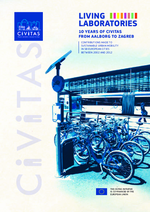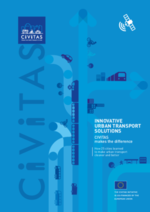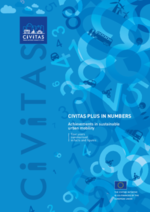MODERN
Under the motto “MObility, Development and Energy use ReductioN”, CIVITAS MODERN connected the cities of Craiova (Romania), Brescia (Italy), Coimbra (Portugal), and Vitoria-Gasteiz (Spain).

About the project
The four MODERN cities put together a package of activities for cleaner and better urban transport based on stakeholder engagement and a performance-led approach. They were keen to build on their past efforts and substantially improve the quality of life for all citizens.
The MODERN cities represented a geographic diversity covering the entire continent, from the Atlantic coast of Portugal through the Basque region and northern Italy to the Balkans. They were similar in size and represented important regional capitals attracting a lot of daily traffic from the surrounding areas.
They also shared the fact that they faced dramatic changes. Most of the cities used to be heavy industrial towns and were going through a phase of renewal. They also struggled with a growing number of cars that was reaching critical dimensions, resulting in enormous social and economic costs.
All of the cities had important old centres with a wealth of cultural and architectural heritage that was threatened by traffic and pollution. Another challenge the MODERN cities faced were increasing costs of providing public transport and accessibility. They recognised innovation as the key to improving efficiency and accessibility of public transport and to protect the environment.
Implementing sustainable mobility
The MODERN cities were well aware that the success of transport policy and mobility improvements is not only a question of technical factors, but crucially dependent on a culture of clean mobility. They were conscious that single interventions have limited impact and therefore chose for an integrated package of 42 measures that formed part of a large-scale programme.
CIVITAS MODERN combined the large-scale application of existing and commercially available technologies with activities that made use of advanced methodologies. The interventions included the replacement of the public transport fleet with cleaner vehicles, systems for traffic management and info-mobility or state-of-the-art promotional campaigns.
Besides promoting sustainable mobility measures and interaction among the participating cities, CIVITAS MODERN specifically focused on encouraging strong cooperation among scientists and technicians to learn from experience and best practice throughout Europe.
Project results
MODERN combined strategic planning with concrete measures. It improved each city’s project management skills, enhanced the ability to create relationships, and leveraged technical knowledge to a higher degree.
The commitment of Craiova, Brescia, Coimbra and Vitoria-Gasteiz to implement a bold set of integrated measures to reduce car dependency and dependency on fossil fuels, optimising the use of energy and limiting emissions in the process, was fulfilled. The most salient innovations are summarised below:
URBAN PLANNING
“A strategic state-of-the-art approach”
In Vitoria-Gasteiz, the concept of “superblock” in the consolidated city was improved by implementing a new public transport network and promoting soft modes thanks to the new modal space allocation.
E-TICKETING
"Stimulating intermodality through technology and service”
In Craiova, Coimbra and Brescia diverse solutions were adopted for the integrated ticketing systems, from single contactless mobility cards for accessing all the mobility services available, to e-ticketing systems installed on buses and trams for connecting the vehicles to a central dispatch system for data collection and processing. Within each city, the solutions proved very promising and produced relevant results so as to become in the future real best practices in Europe.
INNOVATIVE ENERGY SOURCES
“Testing valid alternatives to curb the use of fossil fuels”
In Coimbra, the study of the small-hydro power plant gave a clear perspective on how to generate relevant revenues in favor of public transport as the energy produced in any one of the solutions identified, is in excess of the 750.000 kWh needed by the city’s trolleybuses and mini-electric buses. The 100 kwphotovoltaic plant in Brescia effectively produced about 94 Mwh/yr with a reduction of 47 t of CO2.
CITIES’ COLLABORATION
“Favouring transferability and partnerships”
In every city, the MODERN teams recognised the importance of collaboration and knowledge sharing and thus fostered coherent ways of operating. The mutual support given in the definition of the tendering processes for the e-ticketing measures in Craiova, Brescia and Coimbra was emblematic of the cooperative attitude cultivated among the partners and the people of MODERN.
The project linked state-of-the-art strategic planning with concrete measures, introducing a broad range of innovative solutions, encouraging transferability and knowledge sharing amongst cities. It pursued robust evaluation activities while disseminating to leverage its efforts.
Notwithstanding all the thoroughness pursued during the project lifetime, the single partners as well as the consortium as a whole, had to face certain challenges that were in most cases successfully tackled.
Cities
Fast Facts
October 2008 - Februray 2013
Project duration
21 partners
Project partners
€13,325,791
Project funding
44 measures
Measures implemented


















